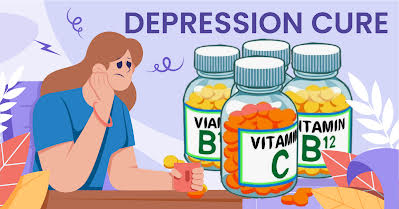Understanding Depression
Depression is a common mental health disorder characterized by persistent sadness, loss of interest, hopelessness, and self-guilt. The disease is influenced by many factors, including genetic, physiological, and environmental factors. Treatments often include psychotherapy, medication, and lifestyle changes, and early intervention and comprehensive treatment are essential for managing depression. Building a support system, maintaining a healthy lifestyle, and focusing on emotional health are key steps.
Exploring Vitamins for Depression Relief
1.Vitamin D: The Sunshine Vitamin
Vitamin D, often referred to as the "sunshine vitamin," plays a crucial role in regulating mood and fighting depression. Studies suggest that low levels of vitamin D are associated with an increased risk of depression. Spending time outdoors in sunlight and incorporating vitamin D-rich foods or supplements can help maintain optimal levels and support mental health.
2.Vitamin B Complex: Nourishing the Mind
The B vitamins, including B6, B12, and folate, are essential for brain function and mood regulation. Deficiencies in these vitamins have been linked to symptoms of depression. Incorporating foods rich in B vitamins, such as leafy greens, whole grains, and lean proteins, can provide a natural boost to mental well-being.
3.Omega-3 Fatty Acids: Brain Food for Mood
Omega-3 fatty acids, particularly EPA and DHA found in fatty fish like salmon and walnuts, have shown promise in reducing symptoms of depression. These essential fats play a vital role in brain health and neurotransmitter function, contributing to improved mood and overall mental wellness.
Incorporating Vitamins into Your Depression Management Plan
1.Consult a Healthcare Professional
Before starting any new vitamin regimen, consult with a healthcare provider to determine the appropriate dosage and ensure compatibility with existing medications or health conditions.
2.Balanced Diet and Supplements
Incorporate a balanced diet rich in fruits, vegetables, whole grains, lean proteins, and healthy fats to support overall well-being. Consider adding vitamin supplements under the guidance of a healthcare professional to fill any nutritional gaps.
3.Lifestyle Factors
In addition to vitamins, prioritize regular exercise, quality sleep, stress management techniques, and social connections to enhance your mental health and combat depressive symptoms.
In Conclusion
While vitamins can complement traditional treatment approaches for depression, they are not a standalone solution. Building a holistic approach that includes proper nutrition, lifestyle modifications, therapy, and social support is essential for managing depression effectively. By incorporating vitamins into your daily routine and seeking professional guidance, you can take proactive steps towards improving your mental well-being and finding relief from depressive symptoms.

